Key takeaways:
- Practical steps for reducing plastic include using reusable bags and containers, sourcing local products, and being mindful of consumption habits.
- Reducing plastic is essential for protecting the environment, decreasing landfill waste, and inspiring collective action towards sustainability.
- Effective plastic reduction strategies can foster community connections, enhance personal experiences, and lead to financial savings.
- Challenges faced in plastic reduction include convenience, social pressure, and limited availability of sustainable options.
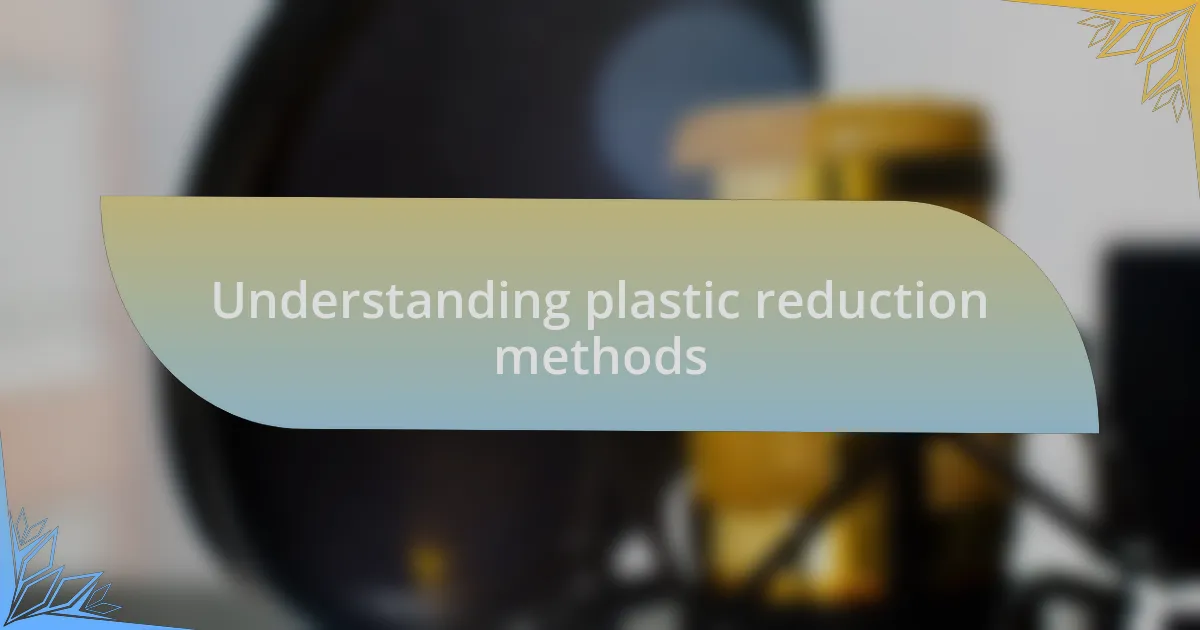
Understanding plastic reduction methods
When I first began exploring plastic reduction methods, I felt overwhelmed by the sheer volume of information available. It’s like walking into a store filled with choices—where do I even begin? I found that breaking it down into manageable steps, such as opting for reusable bags or containers, made a significant difference.
In my journey, I discovered that sourcing local products can greatly reduce packaging waste. For instance, I started visiting farmers’ markets, where I could bring my own containers and cut down on unnecessary plastic. Has anyone else felt that satisfying rush when you leave the market with more ethical choices? The connection to the community and the environment made those shopping trips more impactful for me.
Another effective method I’ve embraced is simply being mindful of my consumption habits. Reflecting on the items I purchase and asking, “Do I really need this?” has been transformative. I’ve noticed that even small changes—like choosing bar soap over liquid soap in plastic bottles—accumulate over time. It’s more than just reducing plastic; it’s about fostering a more sustainable lifestyle, one small choice at a time.
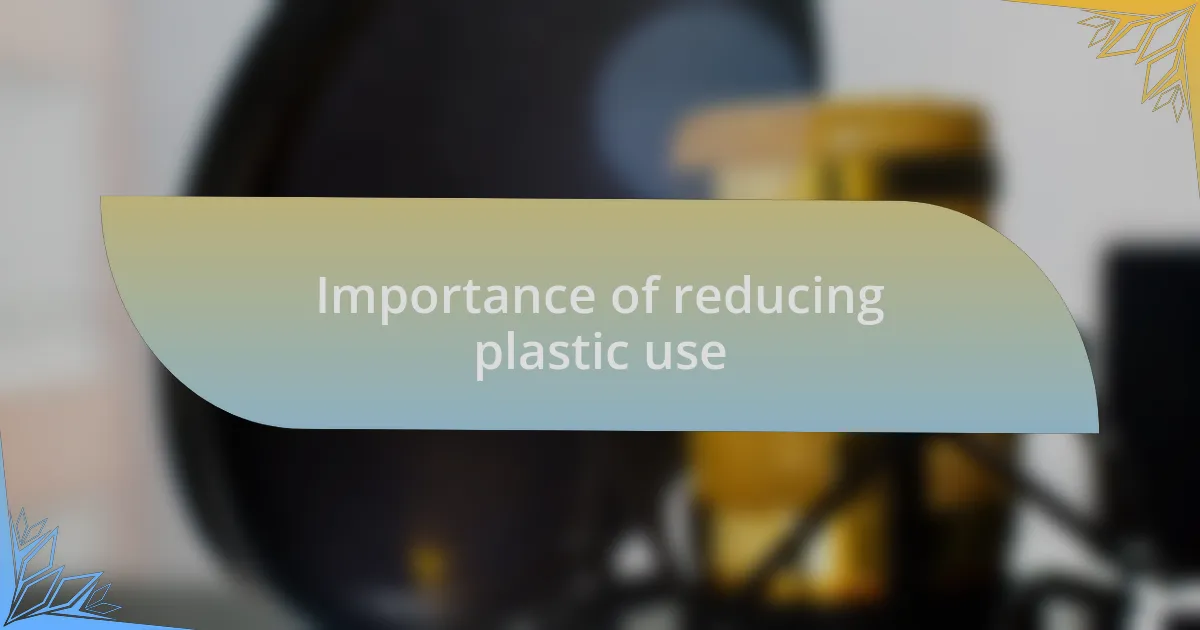
Importance of reducing plastic use
Reducing plastic use is crucial because it directly impacts our environment and health. I remember vividly the moment I first learned how plastic pollution harms marine life; it struck a chord deep within me. Seeing images of turtles entangled in plastic made me reevaluate my choices. Every item we refuse to use can be a small victory for ecosystems at risk.
Moreover, the reduction of plastic contributes to less waste in landfills and a decrease in our carbon footprint. I’ve experienced firsthand the overwhelming sight of overflowing garbage bins packed with single-use plastics. It’s disheartening, but I realized that by choosing alternatives, like glass or metal, I could be part of the solution. Have you ever thought about how satisfying it is to know your choices matter?
Finally, the importance of reducing plastic use extends beyond just individual choices; it’s a collective movement toward sustainability. I often find myself inspired by friends and family who’ve embraced zero-waste lifestyles. Their passion fuels my own desire to learn and adapt. Doesn’t it feel great to be part of a community that is committed to making a positive impact?
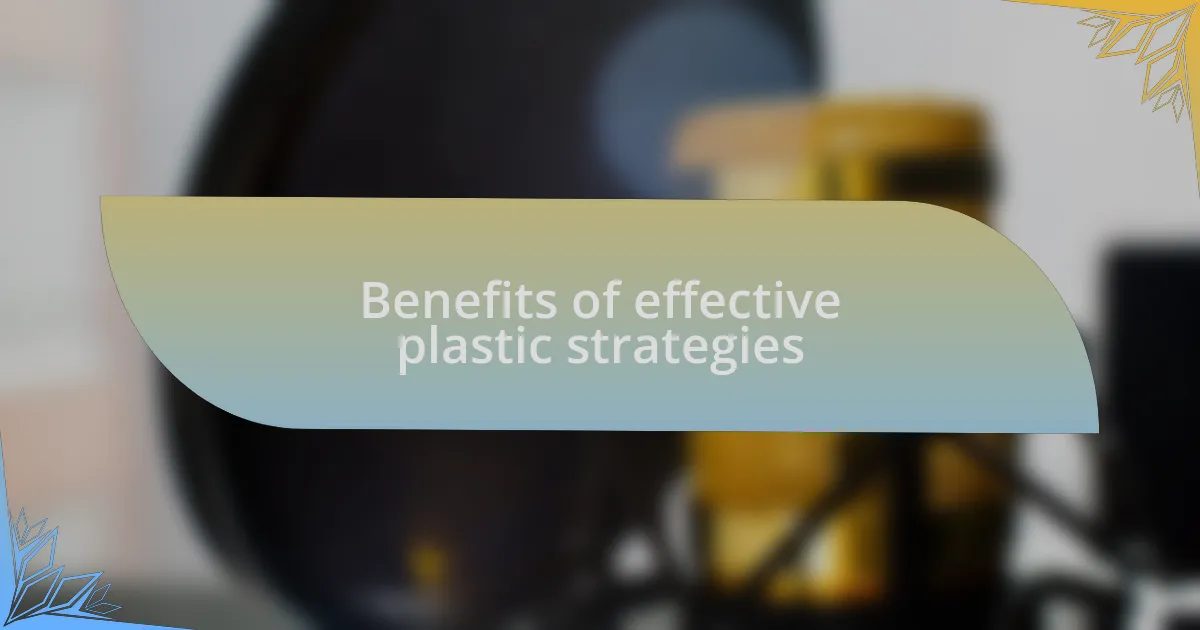
Benefits of effective plastic strategies
Adopting effective plastic strategies yields numerous benefits that resonate on both personal and community levels. For instance, I once transitioned to using reusable bags, and it not only reduced my plastic consumption but also sparked conversations with local shopkeepers about sustainability. This simple choice connected me to others who care deeply about our planet and created a supportive community around shared values.
Additionally, when I began to prioritize products with minimal or no plastic packaging, I noticed a tangible shift in my consumption habits. I felt empowered to explore local markets and prioritize fresh produce over packaged goods. This conscientious approach not only contributed to less plastic waste but also fostered a deeper appreciation for quality products and local sources. Isn’t it rewarding to discover that your purchasing decisions can enhance your life experience while benefiting the environment?
Lastly, implementing effective strategies often leads to financial savings. I remember the initial shock of the money I spent on single-use products; it seemed endless. After shifting to durable alternatives, my expenses decreased as I made fewer repeat purchases. This realization made me reflect: Are we truly aware of the economic impact of our plastic addiction? Embracing sustainable practices can create a win-win scenario for both our wallets and the world around us.
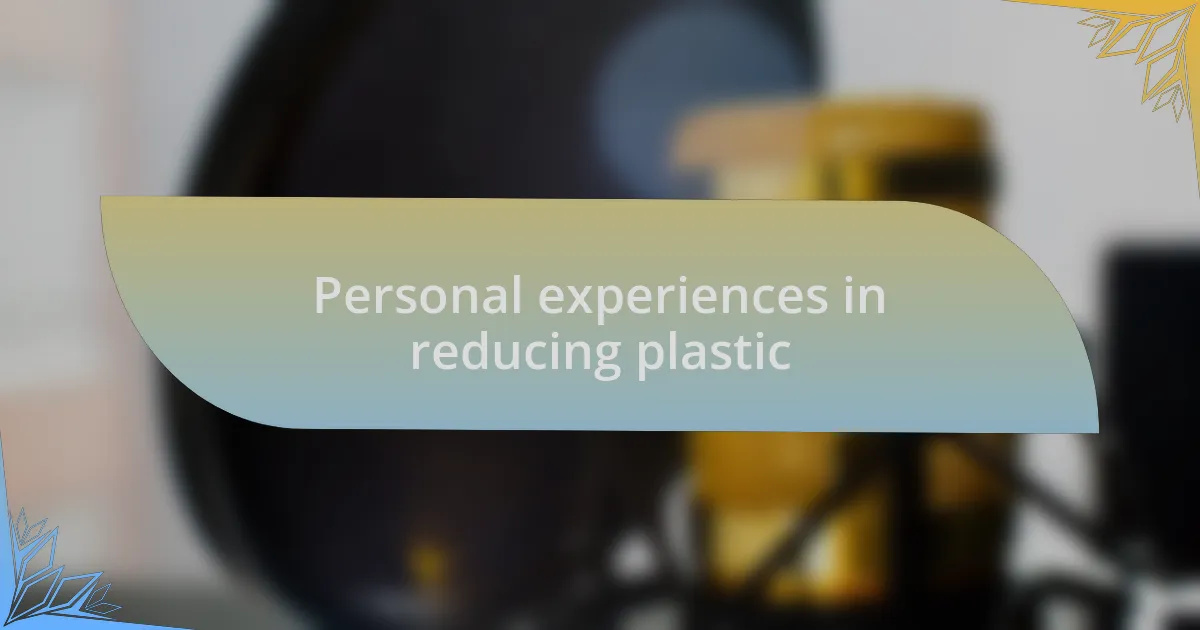
Personal experiences in reducing plastic
One memorable experience I had while reducing plastic was during a camping trip with friends. We decided to ditch all single-use plastic items, which meant bringing our own containers and utensils. Initially, it felt like extra work, but watching everyone embrace this change was inspiring. It reminded me that even small adjustments can lead to meaningful moments, like sharing stories around a campfire without the interference of plastic waste cluttering our surroundings.
I’ve also found that making my own cleaning products has significantly cut back on plastic containers. After experimenting with vinegar, baking soda, and essential oils, I was amazed by how effectively they cleaned my home while leaving no plastic footprint behind. It’s funny how something as simple as mixing a few ingredients could foster a sense of pride and accomplishment. Have you ever felt that shift from consumerism to creativity? It made me realize that reducing plastic doesn’t always have to be a sacrifice—it can also be an exciting journey of self-discovery.
One day, while shopping for groceries, I caught myself reaching for a plastic-wrapped item out of habit. I paused and reconsidered my choices, eventually opting for loose fruits and veggies instead. The exhilaration of that small victory felt monumental. Each time I choose not to buy plastic, I amplify my commitment to sustainable living. It’s these daily choices, grounded in awareness, that fuel my passion for creating a cleaner, greener world. Isn’t it empowering to be part of the solution, even in simple ways?
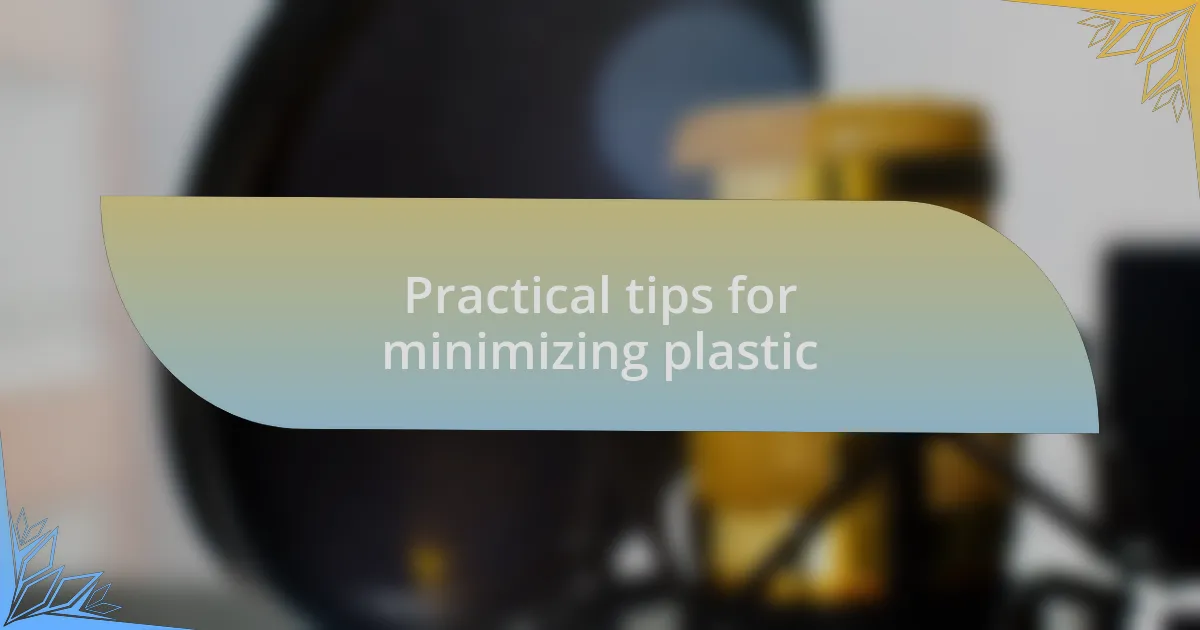
Practical tips for minimizing plastic
One practical tip that has genuinely made a difference for me is using reusable shopping bags consistently. I now keep a few bags in my car, so I never forget them when heading to the store. It surprises me how small this change feels, yet it drastically reduces my impulse to grab those flimsy plastic bags at checkout. Have you ever stopped to think about how many bags we usually go through in a single shopping trip?
Another effective strategy I’ve adopted is opting for bar soap and solid shampoo over their liquid counterparts. Initially, I was skeptical about how well they would work, but I’ve found the quality to be fantastic. Plus, the joy of nostalgia washes over me while using them—reminding me of simpler times. Doesn’t it feel good to know you’re choosing products that are kinder to our planet with every wash?
Lastly, I’ve started to give second life to containers, particularly jars. Whenever I finish a jam or a sauce, I wash the jar and repurpose it for storage. It’s amazing how creative I can get, transforming them into meal prep containers or even little planters for herbs. Have you ever realized the potential we have to transform something seemingly useless into a valuable item? Each time I do this, I feel a surge of pride, knowing that I’m reducing waste just by being a bit inventive.
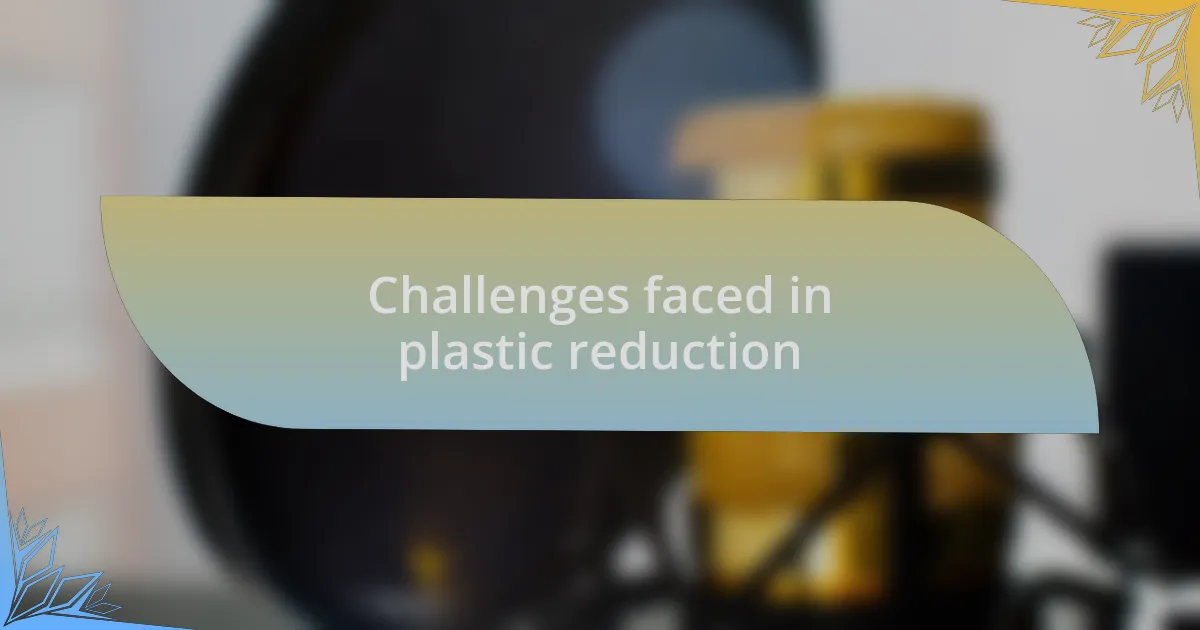
Challenges faced in plastic reduction
Reducing plastic use comes with a set of unique challenges that can often feel overwhelming. For instance, I find myself constantly battling convenience. Take a trip to the grocery store; the temptation of ready-to-eat meals wrapped in plastic is hard to resist. Have I ever made a rash purchase simply because it’s more accessible? Absolutely. This ease often overshadows my resolve to make sustainable choices.
Another obstacle I’ve encountered is the social pressure that can arise when trying to reduce plastic. When friends opt for takeout in those single-use containers, I sometimes feel out of place using my reusable items. It’s a struggle to balance my commitment to plastic reduction with wanting to fit in and enjoy the moment. Don’t you think it’s tough to stay true to your values when they seem to set you apart from the crowd?
Finally, I can’t overlook the lack of available alternatives in various settings. It’s frustrating to be in a café and see only plastic straws or lids. When I forget to bring my own reusable options, it almost feels like a setback in my journey. Have you ever found yourself in a situation where you wish more establishments would prioritize sustainability? It certainly makes me long for a time when reducing plastic is the standard, not the exception.